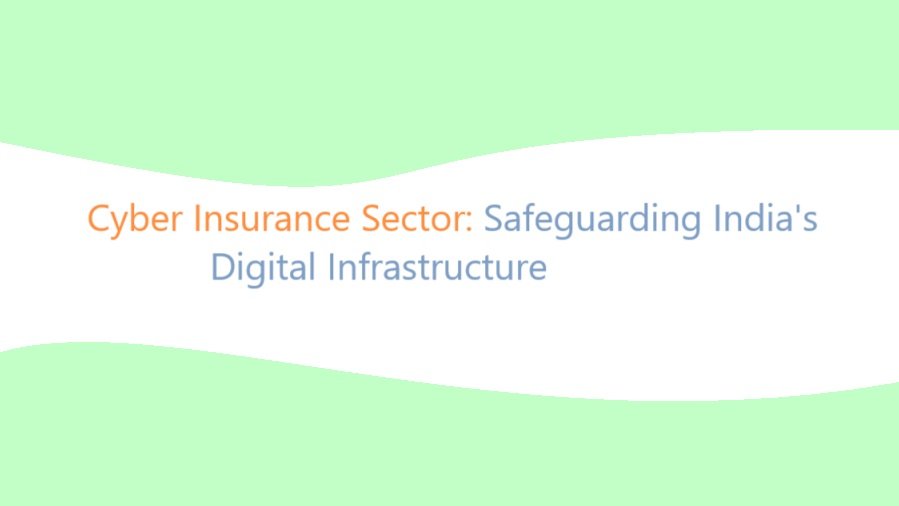Cyber Insurance Sector: Safeguarding India’s Digital Infrastructure
India’s rapid digital transformation has brought about numerous advantages and opportunities. However, it has also exposed individuals and businesses to various cyber threats. As the country’s digital economy continues to grow, the need for robust cybersecurity measures becomes increasingly important. One such measure that is gaining traction is cyber insurance.
The Rise of Cyber Threats
The digital revolution has undoubtedly improved efficiency and convenience in various sectors. However, it has also opened up new avenues for cybercriminals to exploit vulnerabilities. Cyber threats such as data breaches, ransomware attacks, and identity theft have become more sophisticated and prevalent.
In 2022, cyberattacks surged across various industries, with the government sector being particularly targeted. India, the US, Indonesia, and China collectively reported about 40% of all government-related incidents globally, marking a 38% increase from 2021. According to India’s national cyber security agency, CERT-IN, the country faced 1.39 million cybersecurity incidents in 2022 alone. The escalating frequency of cybercrimes against businesses and organizations underscores the urgent necessity for widespread adoption of cyber insurance.
As per findings from a Deloitte market analysis, the current valuation of India’s cyber insurance market stands at approximately $50-60 million, with a projected expansion at an impressive compound annual growth rate (CAGR) of 27-30% within the upcoming 3-5 years. On a global scale, the cyber insurance market surpassed $12 billion in 2022. Forecasts indicate that over the subsequent seven years, this market is anticipated to burgeon at a CAGR of approximately 26%, reaching beyond $63 billion by 2029. These statistics underscore the growing importance of the cyber insurance sector within the rapidly expanding digital economy.
Understanding Cyber Insurance
Cyber insurance is a specialized form of insurance designed to protect individuals and businesses from financial losses resulting from cyber incidents. It provides coverage for various aspects, including data breaches, business interruption, legal expenses, and reputational damage.
The coverage offered by cyber insurance policies varies depending on the insurer and the specific policy. Some policies may also include additional services such as incident response teams and cybersecurity training.
Benefits of Cyber Insurance
1. Financial Protection: Cyber insurance provides financial protection against the costs associated with cyber incidents. This includes expenses related to data recovery, legal fees, and regulatory fines. It can help businesses recover quickly and minimize the financial impact of a cyber attack.
2. Reputation Management: A cyber attack can severely damage a company’s reputation. Cyber insurance can cover the costs of public relations and communication efforts to restore trust and credibility with customers and stakeholders.
3. Business Continuity: Cyber attacks can disrupt business operations, leading to significant revenue loss. Cyber insurance can provide coverage for business interruption, ensuring that operations can resume as quickly as possible.
4. Risk Assessment and Mitigation: Many cyber insurance policies offer risk assessment services to help identify vulnerabilities and implement preventive measures. Insurers often work closely with policyholders to strengthen their cybersecurity practices and reduce the likelihood of future incidents.
Cyber Insurance in India
India’s cyber insurance market is still in its nascent stage but is witnessing steady growth. With the increasing awareness of cyber threats, more businesses are recognizing the importance of having cyber insurance coverage.
The Insurance Regulatory and Development Authority of India (IRDAI) has also taken steps to promote cyber insurance. In 2017, it issued guidelines for insurers to develop standalone cyber insurance policies. These guidelines outline the coverage, exclusions, and other terms and conditions related to cyber insurance.
However, despite the potential benefits, the adoption of cyber insurance in India is relatively low compared to other countries. Many businesses are still unaware of the risks they face and the protection offered by cyber insurance.
As businesses embrace digital tools and collect large amounts of customer data to grow, they become more vulnerable to cyber threats. Cyber attacks can severely harm small businesses, causing damage to their reputation, financial losses, and sometimes even forcing them to close permanently. With cyber threats becoming more frequent and sophisticated, having cyber insurance is essential, along with strong cybersecurity measures, to manage risks effectively. For instance, under the Digital Personal Data Protection (DPDP) Act 2023, businesses can face fines of up to INR 250 crore for personal data breaches, which could be enough to shut down small businesses.
A report from IRDAI, India’s insurance regulator, breaks down the types of losses covered by cyber insurance into four main categories:
1. First Party Losses: This covers direct financial losses, expenses for data recovery, compensation for business interruptions, and costs for minimizing the impact of cyber incidents.
2. Regulatory Actions: This includes expenses related to regulatory investigations, fines, penalties, and legal defense costs arising from regulatory actions.
3. Crisis Management Costs: This covers various expenses such as hiring forensic experts, security consultations, managing reputation damage, legal fees, notifying affected parties, coordinating with service providers, providing credit and identity theft monitoring, dealing with cyber extortion or ransomware, operating a 24×7 hotline, addressing cyber stalking, providing counseling services, removing compromised information, and taking legal action.
4. Liability Claims: This involves legal liabilities and damages resulting from privacy breaches, data or security breaches, defamation, infringement of intellectual property rights, and associated legal defense costs.
The Indian Government has taken significant steps to enhance cybersecurity through various initiatives:
1. Indian Cyber Crime Coordination Centre (I4C): Established in 2018 under the Ministry of Home Affairs, I4C helps citizens deal with cybersecurity issues more effectively by enhancing coordination among law enforcement agencies and stakeholders.
2. National Critical Information Infrastructure Protection Centre (NCIIPC): This center safeguards critical information infrastructures from unauthorized access, modification, or disruption, ensuring digital safety and cybersecurity.
3. Cyber Swachhta Kendra: This initiative offers free tools for detecting and removing botnets, helping clean and secure affected computer systems.
These efforts, alongside regular cybersecurity drills and exercises, aim to boost India’s cybersecurity preparedness. By improving the overall security posture of businesses and organizations nationwide, these initiatives indirectly support the growth of the cyber insurance market.
The Way Forward
As India’s digital economy continues to expand, the importance of cyber insurance cannot be overstated. Businesses must prioritize cybersecurity and consider cyber insurance as an essential component of their risk management strategy.
Government initiatives, industry collaborations, and increased awareness campaigns can help promote the adoption of cyber insurance in India. It is crucial for businesses to understand the risks they face and take proactive measures to safeguard their digital assets.
Cyber insurance, coupled with robust cybersecurity measures, can fortify India’s digital economy and ensure a secure and resilient digital landscape for individuals and businesses alike.
Sources:
- Invest India
- https://www2.deloitte.com/in/en/pages/Cyber-insurance-in-india-navigating-risks-and-opportunities-in-a-digital-economy.html
- https://www.cert-in.org.in/Downloader?pageid=22&type=2&fileName=ANUAL-2023-0001.pdf
- https://www2.deloitte.com/in/en/pages/Cyber-insurance-in-india-navigating-risks-and-opportunities-in-a-digital-economy.html
- https://www.csk.gov.in/
- https://irdai.gov.in/document-detail?documentId=976463




